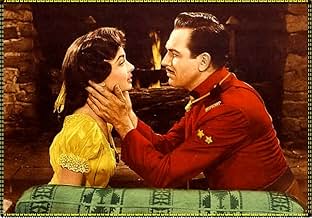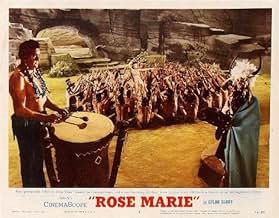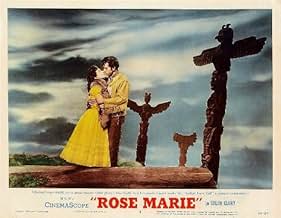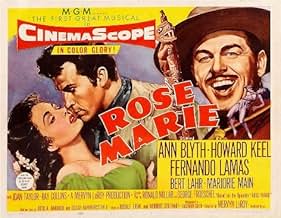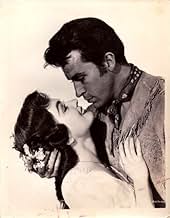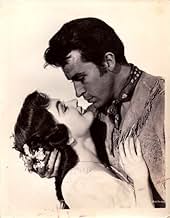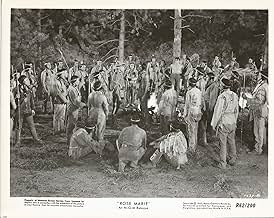IMDb RATING
5.8/10
573
YOUR RATING
Wilderness girl Rose Marie has adventures in life and love when Mountie Mike Malone takes her out of the wild.Wilderness girl Rose Marie has adventures in life and love when Mountie Mike Malone takes her out of the wild.Wilderness girl Rose Marie has adventures in life and love when Mountie Mike Malone takes her out of the wild.
Dorothy Adams
- Townswoman
- (uncredited)
Fred Aldrich
- Woodsman in Saloon
- (uncredited)
Robert Anderson
- Corporal
- (uncredited)
John Angelo
- Man at Charity Dance
- (uncredited)
Emile Avery
- Mountie
- (uncredited)
Walter Bacon
- Man at Charity Dance
- (uncredited)
Al Bain
- Woodsman in Saloon
- (uncredited)
Margaret Bert
- Townswoman
- (uncredited)
Chris Willow Bird
- Indian
- (uncredited)
Oscar Blank
- Woodsman in Saloon
- (uncredited)
Featured reviews
Not enough good things can be said about this beautiful musical, one of my favorites. It has the right combination of romance, conflict, suspense, tragedy, and comedy in the plot. The setting is in the colonial or exploration era of Canada, and the rivalry between English and French Canadians is evident.
The story is about Rose Marie (Ann Blyth), a tomboyish girl that her guardian Mountie (Howard Keel) tries to civilize. Rose Marie is grateful to him, but she truly loves the French trader Duval (Fernando Lamas), who accepts her as she is. The unrequited love an Indian girl has for Duval adds to the conflict and leads to the tragic elements in the film. However, justice and a happy ending prevail.
I commend Turner Broadcasting for keeping "Rose Marie" alive by showing it on the movie channel, but I would love to have a quality DVD version. I hope it will be on DVD soon.
The film has inspired me to look for the sheet music and script from the musical, and I am very disappointed that I cannot find a "Rosemarie" songbook. If any music and script publishers are listening, they should have the score and script of this film in print.
The story is about Rose Marie (Ann Blyth), a tomboyish girl that her guardian Mountie (Howard Keel) tries to civilize. Rose Marie is grateful to him, but she truly loves the French trader Duval (Fernando Lamas), who accepts her as she is. The unrequited love an Indian girl has for Duval adds to the conflict and leads to the tragic elements in the film. However, justice and a happy ending prevail.
I commend Turner Broadcasting for keeping "Rose Marie" alive by showing it on the movie channel, but I would love to have a quality DVD version. I hope it will be on DVD soon.
The film has inspired me to look for the sheet music and script from the musical, and I am very disappointed that I cannot find a "Rosemarie" songbook. If any music and script publishers are listening, they should have the score and script of this film in print.
Saw this on a massive CinemaScope screen during its first-run release at the Egyptian Theater in Hollywood, California. If memory serves (since I haven't caught it on a Turner Classic Movies broadcast recently) it was enjoyable and nicely mounted, although I seem to recall that a lot of it was done on some massive MGM soundstages rather than outdoors in the northern California and Canadian locations. Of course that was usually the case with musicals with outdoor settings. Technical considerations prompted the studios to go the easy route of utilizing the more easily controlled environments of, in MGM's case, their Culver City, Calif. lot and stages subbing for the great outdoors. Howard Keel and Ann Blyth (and Fernando Lamas, too) acquitted themselves quite nicely in the vocal department. And any movie that gives us Marjorie Main and Bert Lahr for some expert comic relief is to be fondly remembered. Although its popularity may not merit it, it would be nice to add a DVD version, not yet available, it appears, of this widescreen/stereo remake to one's video library.
MGM's first CinemaScope musical is pictorially splendid, with what looks like on-location shooting of the Canadian wilderness, or a very good faking thereof. The lake and mountain vistas must have been spectacular on the big screen; even on a TV screen they're impressive. Also, the screenwriters dump the pretensions that marred the 1936 Nelson-Jeannette version and return closer to the 1924 stage story, streamlining it nicely and removing some of the clunkiness in the dialog. Only a handful of the original Friml-Harbach-Hammerstein-Stothart songs survive, but several of the new ones are by Friml, too (with lyrics by Paul Francis Webster), and one, "I Have the Love," is quite nice. Ann Blyth, while not credibly a backwoods French-Canadian, is lovely and with a fine set of soprano pipes, and Howard Keel reminds us again of how Hollywood underrated him--one of our most masculine musical leading men, with an easy understated acting style to back up his booming vocals. Fernando Lamas hasn't that much to do, and it feels unfair that one of Ms. Blyth's leading men has to be a good sport and just step back and let her love the other. And Bert Lahr may be a comic genius, but his and Marjorie Main's material is so rotten that you tend to forget it. Still, a couple of soundstage scenes aside, it's a gorgeous big-screen production, and not as dramatically inert as many other operetta-derived musicals. A very pleasant 107 minutes.
In this third film of Rose Marie and probably the last one we'll ever see, every single version of the film is different to each other and to the plot of the original Broadway show. Since operettas are a thing of the past I doubt another version would be made. Where would you get voices like Ann Blyth, Howard Keel and Fernando Lamas?
This version has Ann Blyth as Rose Marie, a trapper's daughter now alone out in the woods. Though she's pretty capable of taking care of herself, those in authority don't see it that way. Mountie Howard Keel brings her into what passes for civilization in the Canadian west at the turn of the last century.
Keel's seeing Ann in a whole different light when she puts on a dress, but trapper Fernando Lamas will take her any old way, so Ann's got to choose between them.
The main songs from the 1936 version make it here, you couldn't really do Rose Marie without Indian Love Call, The Mountie Song or the title number. Rudolf Friml wrote some other nice songs for the original Broadway production which didn't make it into the classic Nelson Eddy/ Jeanette MacDonald version or this one.
Friml contributed some new songs in what would turn out to be his next to last songwriting assignment and they're well suited for the voices that have to sing them. Otto Harbach and Oscar Hammerstein, II did the original lyrics for Broadway, but in this Paul Francis Webster collaborated with Friml and provided the words.
For comic relief we have Marjorie Main and Bert Lahr, playing something along the lines of a cowardly Mountie. But actually he proves to be of invaluable help to Howard Keel.
Keel in his memoirs was not originally satisfied with the Mountie part, feeling he was written like a Dudley DooRight idiot in the first draft. Some considerable rewriting was done before he went before the camera.
He also tells of a practical joke that second unit director Howard Koch pulled on director Mervyn LeRoy by having Jack Benny show up in a Mountie uniform and mess up the takes of the Mountie Song. Benny and LeRoy were good friends and when LeRoy realized who it was, he broke up and shooting was done for the day.
Busby Berkeley got some work in this film, staging the Totem Tom Tom number. There are words to the song, but you won't hear any in this or in the earlier one. Totem Tom Tom is nicely choreographed. I'm always amazed at how Rudolf Friml who studied under Anton Dvorak in Prague before coming to America was able to capture the American Indian rhythm with that song.
This 1954 version of Rose Marie has enough merit to it that it does not suffer comparison with what Nelson and Jeanette did back in the day. Fans of operetta will like it, even devoted Eddy/Mac people.
This version has Ann Blyth as Rose Marie, a trapper's daughter now alone out in the woods. Though she's pretty capable of taking care of herself, those in authority don't see it that way. Mountie Howard Keel brings her into what passes for civilization in the Canadian west at the turn of the last century.
Keel's seeing Ann in a whole different light when she puts on a dress, but trapper Fernando Lamas will take her any old way, so Ann's got to choose between them.
The main songs from the 1936 version make it here, you couldn't really do Rose Marie without Indian Love Call, The Mountie Song or the title number. Rudolf Friml wrote some other nice songs for the original Broadway production which didn't make it into the classic Nelson Eddy/ Jeanette MacDonald version or this one.
Friml contributed some new songs in what would turn out to be his next to last songwriting assignment and they're well suited for the voices that have to sing them. Otto Harbach and Oscar Hammerstein, II did the original lyrics for Broadway, but in this Paul Francis Webster collaborated with Friml and provided the words.
For comic relief we have Marjorie Main and Bert Lahr, playing something along the lines of a cowardly Mountie. But actually he proves to be of invaluable help to Howard Keel.
Keel in his memoirs was not originally satisfied with the Mountie part, feeling he was written like a Dudley DooRight idiot in the first draft. Some considerable rewriting was done before he went before the camera.
He also tells of a practical joke that second unit director Howard Koch pulled on director Mervyn LeRoy by having Jack Benny show up in a Mountie uniform and mess up the takes of the Mountie Song. Benny and LeRoy were good friends and when LeRoy realized who it was, he broke up and shooting was done for the day.
Busby Berkeley got some work in this film, staging the Totem Tom Tom number. There are words to the song, but you won't hear any in this or in the earlier one. Totem Tom Tom is nicely choreographed. I'm always amazed at how Rudolf Friml who studied under Anton Dvorak in Prague before coming to America was able to capture the American Indian rhythm with that song.
This 1954 version of Rose Marie has enough merit to it that it does not suffer comparison with what Nelson and Jeanette did back in the day. Fans of operetta will like it, even devoted Eddy/Mac people.
Bears little resemblance to the (better) MacDonald/Eddy version, at least what little I can remember of it. Very much in the style of musical that MGM would do for the better part of the 50's, for better and worse. As such, it was fine. Would have improved had they cut the entire Duval/Wanda subplot and just focused on Howard Keel and Ann Blyth. Busby Berkeley worked on the staging of the musical sequences --his last major theatrical film until 1962's Jumbo-- but there was really only one short sequence which clearly bore his fingerprints: the one involving the Native American medicine man (Thurl Ravenscroft, best known for How the Grinch Stole Christmas) and a group dance centered around Wanda. In retrospect, considering Berkeley's Hollywood career as just about over, this was a fitting bookend to someone whose very first Hollywood job was on the Eddie Cantor musical, Whoopee!, faint echoes of which appeared in that aforementioned sequence. Aside from that sequence, the best part of the film was a comic number by Bert Lahr, doing a more up-tempo variation on his big number from The Wizard of Oz ('If I Were King of the Forest'). For me, this lost steam about two-thirds of the way through and never really recovered. And I didn't like the ending either. Well-produced, but still rather middling.
Did you know
- TriviaJoan Crawford, who played Ann Blyth's mother in Le roman de Mildred Pierce (1945), played the title role in the original 1928 version of this film, which is now considered lost.
- GoofsContrary to what is written on the DVD jewel-box, the "Totem Tom-Tom" number doesn't appear in this version of the operetta. It was replaced by the Totem Dance that is seen in the film.
- ConnectionsFeatured in MGM/UA Home Video Laserdisc Sampler (1990)
- SoundtracksRose Marie
Music by Rudolf Friml
Original Lyrics by Otto A. Harbach and Oscar Hammerstein II
Revised Lyrics by Paul Francis Webster
Performed by Howard Keel; reprised by Bill Lee and the Mounties
- How long is Rose Marie?Powered by Alexa
Details
- Runtime1 hour 44 minutes
Contribute to this page
Suggest an edit or add missing content



